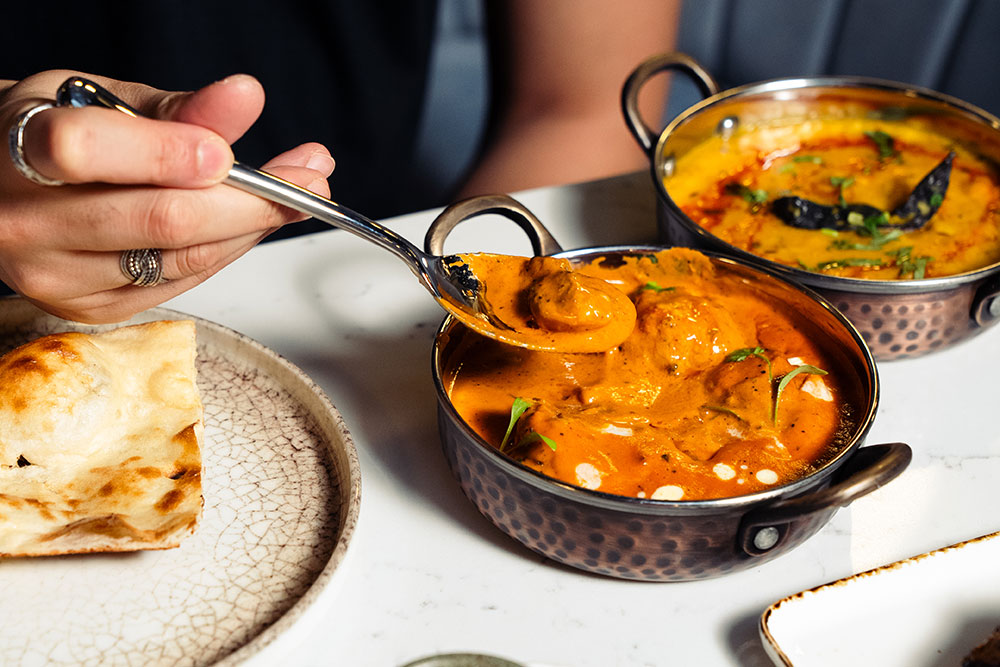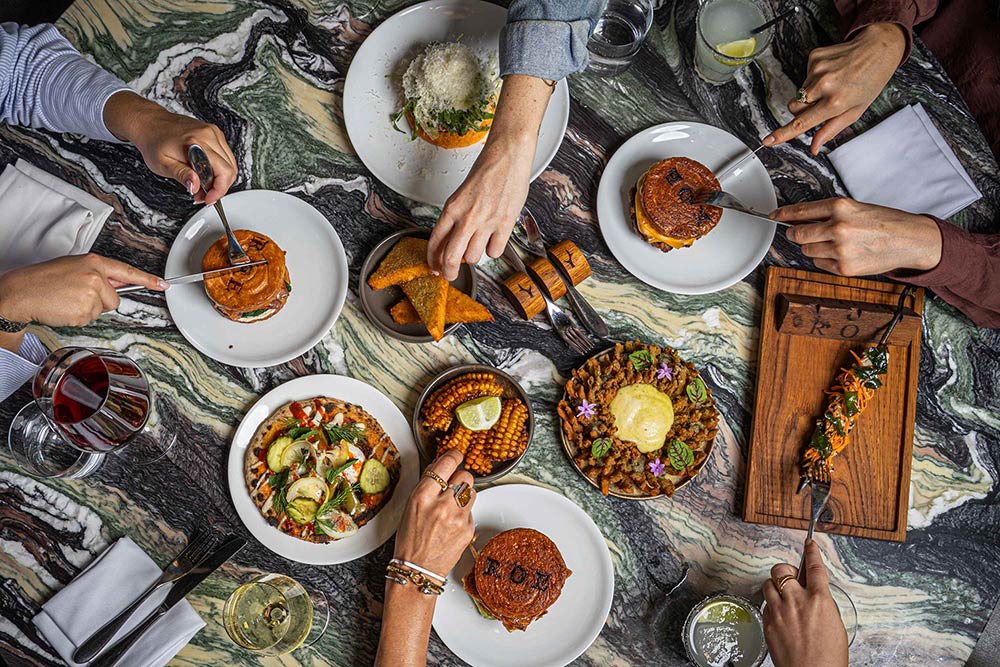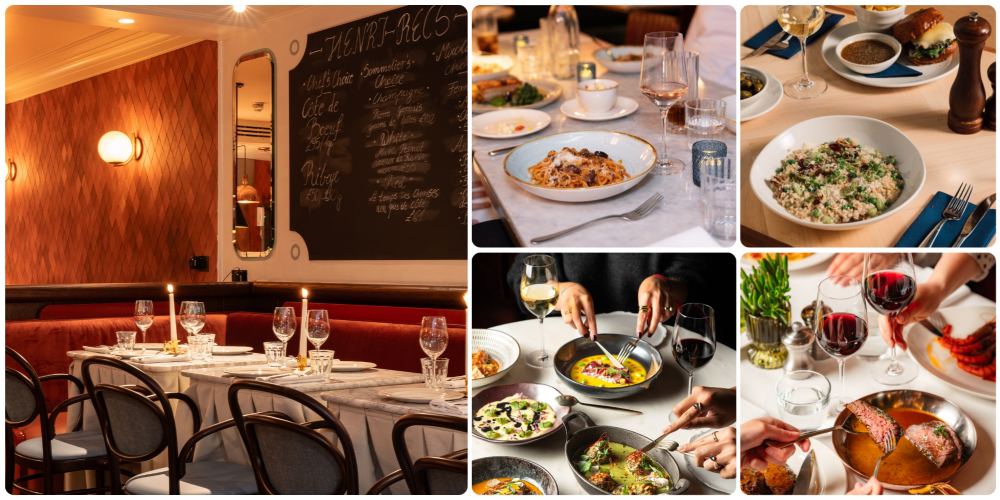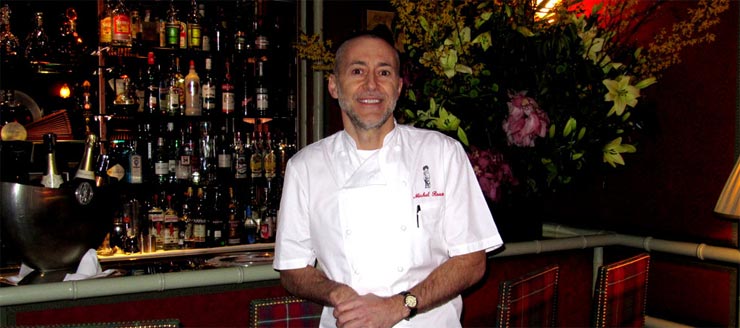
There are TV chefs and then there are chefs who appear on TV. Michel Roux Jnr is unquestionably the latter, despite racking up plenty of broadcast hours first as the clinical foil to garrulous Greg Wallace in MasterChef The Professionals and now heading up his own show, Michel Roux’s Service.
The son of Albert Roux and nephew of Michel Roux, he came to work at Le Gavroche the year Albert and Michel split the Roux empire in two. More recently he added two new restaurants to the mix, Roux at Parliament Square and, in partnership with his father once more, Roux at the Landau in London’s Langham Hotel.
Hot Dinners caught up with Roux for a chat at Le Gavroche to find out why chefs should pay more attention to their front of house and to ask whether he’s actually seen those Masterchef spoofs on youtube…
Your most recent opening is at the Langham hotel. Given your experience last time with hotel openings (Roux closed his restaurant at a resort in Mauritius in 2005 just 10 months after it opened) what persuaded you back into this part of the business?
The problem with the restaurant we opened in Mauritius was that it was a new-build and a lot of the issues stemmed from that fact. But obviously the Langham is not a new build – it’s been recently refurbished and it’s a well-oiled machine. They approached us and it was a perfect opportunity
Why did you decide to go back into business with your father again?
Well this brings both our qualities together as one and I think it works well in a hotel environment. The head chef we’ve appointed, Chris, worked with me for the past four years at Le Gavroche. I consider him not only a rising star as a chef, but he’s also a friend. My father will be bringing to the table more of his financial expertise in the running of a restaurant in a hotel, because he has a lot of previous experience of that.
With the chefs working for you - is it important to you to create opportunities for them to take on their own places?
Yes it’s very, very important. It’s also part and parcel of the Roux ethos as well – to train young chefs and front-of-house, to help them on their way and help them achieve their dreams and goals within the fold.
But your last partnership with Roux scholarship Daniel Cox in the kitchen at Roux at Parliament Square ended after ten weeks. What went wrong?
Dan’s an extremely talented chef – you don’t win the Roux scholarship without being that. He’s still part of the Roux family because he won the scholarship. But unfortunately it didn’t work out for him there. There are certain chefs who reach the point in their career where it’s time to be given a job of management, which a Head Chef is, and maybe it’s our fault as we thought that Dan was ready for it and he wasn’t. Dan has now moved on, but he’s still very much part of our thoughts and we shall we working together again in the future.
When you first came to work at Le Gavroche was your approach to the job in the spirit of revolution or evolution?
Definitely evolution. A restaurant that’s been open, like Le Gavroche, for 44 years now could stagnate and then fall by the wayside because of lack of interest, but you could also alienate your loyal customers by changing things overnight. So it’s definitely evolution – very slowly changing and keeping up with the times; making it interesting but not changing from your roots which are very important.
Keeping up with the times?
...the cheese soufflé has halved in its calorie count since the sixties. And it’s still as popular
By that I mean new technologies of cooking and lighter recipes – for example the cheese soufflé has halved in its calorie count since the sixties. And it’s still as popular.
Have you seen a difference in the kind of people who come to Le Gavroche?
We’ve definitely seen a change. Back in the seventies or eighties, a place like Le Gavroche was frequented only by the hoi polloi, the toffs and celebrities – the average age of the customer was fairly high. Whereas now it’s frequented by all and sundry who can save a few pennies to come.
Because to be honest we are expensive. We’re not the most expensive – that’s a fallacy – but good food and good service comes at a price and we are in Mayfair. So yes, the average age of the customer has come down from those in their fifties and sixties to the forties. That’s been led by the media.
The knowledge our customers have is much more widespread than it was. Even your taxi driver now is an expert in food and wine, which is wonderful – it’s the way it should be.
Are you aware of the explosion of food blogs on the internet? Do you read any of them?
I really don’t have the time to switch on the computer and troll through the vast amount of dross that’s on the internet. Anyone can post anything they want – truthful or not and that I find a little bit scary. I haven’t read any of these people and don’t wish to read them.
So do we take it that you haven’t seen the spoofs of MasterChef on youtube?
I have seen that – quite a few of the spoofs actually. I think they’re brilliant but it’s very sad that people can actually spend the time making that. There’s a lot of people who have nothing better to do.
It was a bit of a surprise when you turned up on MasterChef: The Professionals. What made you decide to take part?
I’ve always shied away from television and still do. The only television I do has to represent exactly how I feel and reflect the passion I have for this industry. It has to have a very serious slant to it and it has to have a lot of factual take-home for the viewer as well, so that at the end of the programme the viewer can say they’ve learned something or been enriched. It may sound a bit pompous, but I wouldn’t want to do television just for entertainment.
And that’s why MasterChef: The Professionals, when it came along I thought, this is the project I want to do. It’s valid – it’s just me. And when I say it’s me, it’s Roux as well, because the Roux ethos has always been to help youngsters on their way, which is what MasterChef is doing. It’s extremely aspirational for youngster and inspirational for chefs. And I think it’s a success – viewers love it.
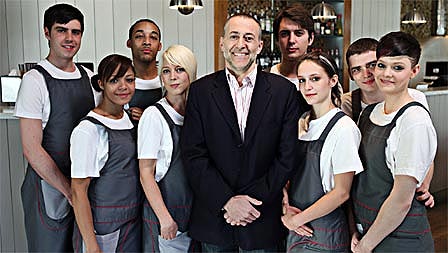 So what can you tell us about the new programme Michel Roux’s Service?
So what can you tell us about the new programme Michel Roux’s Service?
This programme has been on the back burner for a couple of years. It’s been a long, long time coming. The original idea was just to make a video for training purposes. I think the result is going to be brilliant. I’m taking eight trainees – aged from 17 to 24. They’ve all had issues – some are from broken homes, some had issues with the law – but they’re all a perfect reflection of Britain today.
How were the final people chosen?
They were taken from normal BBC casting – whittled down from many thousands down to 20 or so then I had a say. None of them had worked in the industry before.
What were you looking for?
A little spark – something that tells me that with a bit of work they’d be able to do well.
And in return what are they getting?
First of all I’m teaching them life skills, and giving them hope and respect. That’s what shocked me the most when I met them – the lack of self esteem that they had and, for the most part, politeness. I had to teach them the basics – please and thank-you. Just basic life skills that I was taught by my parents and teachers, which have obviously totally disappeared.
I take them on an incredible journey using service as the vehicle. It’s not an elimination programme – I want all eight to finish as winners. I want all eight to fall in love with the service industry and to realise that they can have a future. Every step there’s a challenge for them. It’s extremely emotional and I get very attached to them, as you can imagine.
At the end we have two scholarships on offer – one for wine, a sommelier scholarship and one for front-of-house. So it is a life changing opportunity. It’s a great programme and I’m very proud of it.
The great British public think that the be-all and end-all in any restaurant is the chef. Well it’s not – it’s more than that. It’s about time we put service at the top of the menu.
Do you think the English have a deep-rooted issue with being in service?
We’ve glorified the chef in Britain. Any time you turn on the TV now there’s a chef on. The great British public think that the be-all and end-all in any restaurant is the chef. Well it’s not – it’s more than that. It’s about time we put service at the top of the menu.
Chefs tend to be chefs and stay in the kitchen, but there’s a lot more to running a business – you need good front of house. And as we all know, if you go to a restaurant and the food’s great but the service is terrible you just won’t return – it’s as simple as that. It doesn’t matter how good the food is. Whereas the opposite is true that if the food is mediocre but the service is fantastic – you get a great welcome and they make you feel really special, you’ll return time and time again.
It should be part of your dining experience – a lot of chefs don’t understand that and they go out of business very quickly. There’s a still an us or them attitude with front of house and back of house which is wrong. Here it’s always been the way that we should get on together and work as a team.
How many British people do you have working front of house at Le Gavroche?
For the most part they’re French. I only have two British in a team of 26 front of house which is ridiculous. In the kitchens for the last ten/fifteen years we’ve had a huge influx of British chefs, so why can’t we do the same for the front of house? Service is still seen in Britain as a stop-gap job or holiday job – it’s almost seen as demeaning, which is wrong. Bottom of the ladder the pay is bad – but it’s the same in kitchens. But if you’re passionate and you show enough desire you can climb up that ladder very quickly. It’s a very rewarding job and you can travel the world.
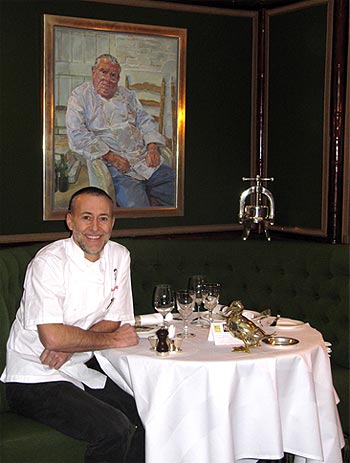 You’ve said that one of the most important sources of inspiration for you as a chef is eating out. With that in mind, where in London have you found inspiration lately?
You’ve said that one of the most important sources of inspiration for you as a chef is eating out. With that in mind, where in London have you found inspiration lately?
Bar Boulud is very vibrant and good fun with good charcuterie – good service as well, they’ve got it just right, not too overbearing. One of my favourite haunts is Zuma. Time and time again they never disappoint – the food’s always brilliant. We’re very fortunate here in London for great restaurants. But if I want to go really casual, I’ll eat at home and roast my own chicken or make my own shepherd’s pie thank you very much.
Michelin is about to launch its 2011 UK and Ireland guide next week. Do you think Michelin stars are good for business?
I can give you a long list of restaurants that are not in the guide that are very successful and making lots of money. Being a three star restaurant is expensive - the level of staffing you need and the produce you use – your margins get smaller.
Are you chasing that third star?
No. The most important thing – and a lot of chefs lose focus here and kill themselves over this – is the customers. Without them you haven’t got a restaurant. It’s not the be-all and end-all being acclaimed by the guidebooks. It’s good for the ego, yes. Michelin is the most revered and rightly so. It is the arbiter when it comes to fine dining but are they right or wrong – who am I to say?
At the end of the day it's the paying customer who chooses with his wallet and he’s right. Some chefs go potty about [Michelin stars], lose sleep about it. I feel very sorry for them. I have far more important things to worry about.
Michel Roux’s Service starts on BBC2 on Wednesday 12 March 2011.







